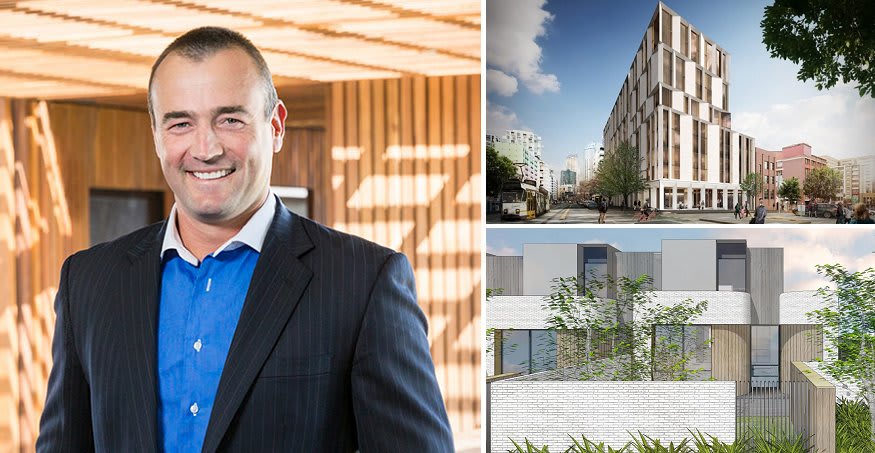A discussion with Little Projects' Construction Director Paris Lechte
Little Projects continues to reinvent its place in the local and national residential market.
Focused for the bulk of its history on high density apartment projects, the developer has now reaffirmed its push into new markets and new development typologies. Apartment developments have been supplemented by aviation, hotel, student accommodation and boutique townhouse pursuits.
On the approval of a maiden townhouse project, Little Projects' Construction Director Paris Lechte took time out to chat with Urban.com.au, regarding the firm's diversification and expectations for the Melbourne and national residential market.
The discussion transpired as follows:
Urban.com.au: Can you outline the shift in market (or company) fundamentals that has seen Little Projects pursue a more diversified development portfolio?
Paris Lechte: We’ve been consistently building on the strength and track record of our development history, expanding our portfolio into complementary sectors in which our residential expertise is incredibly lucrative. With changes to stamp duty, lending, foreign tax and more, the residential market (in particular the high-density space) was somewhat compromised and the student accommodation, hotels, commercial and industrial sectors became more attractive to us.
These sectors have always been in our periphery, so when the market shifted we were ready to take advantage of new opportunities and had actively sought to balance our existing residential operations with our new Hyatt Centric and Melbourne University projects.
To continue our work in the residential space, we knew it meant our product needed to change in line with the market. The removal of investors from the medium to high-density space caused us to refocus our attention on smaller-scale, townhouse developments.
Our newest townhouse projects in Glen Iris and Brighton have been created purely with local owner-occupiers in mind.
U: ADDARC have been utilised for the first time by Little Projects - how was the design firm appointed to the Brighton townhouse project?
PL: ADDARC is the brainchild of Rohan Appel, who has worked with Little on previous projects during his time at SJB.
We were impressed by ADDARC’s early work and have always maintained an interest in their projects. When Brighton came about, we already knew ADDARC’s design sensibility and approach would be perfectly suited to the higher-end homes we were envisaging.
U: How difficult is it to source appropriate townhouse sites currently?
PL: At the moment, townhouse sites are the most difficult to procure. Demand for this type of property is higher than ever, especially in established suburbs like Brighton and Glen Iris, where land is more tightly held and appropriate sites are few and far between.
The sites that do exist are met with fierce competition as developers vie for the opportunity to capitalise on this demand.
As a result, we’ve become more direct in our acquisition approach and are actively pursuing joint ventures with landowners. In opening ourselves up to partnerships like this and empowering private landowners to realise the value of their blocks, we are quickly building a pipeline of sites primed for townhouse development.
U: Speaking of joint ventures with landowners, was the Prahran site in planning one such example and what features will define that project?
PL: Yes. Prahran is a JV with the landowner.
It's designed with sensitivity to the adjoining park in mind, Plus Architecture’s response features a sloping façade to Grattan Street. This prevents any overshadowing of Grattan Gardens and creates a visual spectacle that can be appreciated by locals and residents alike.
U: How have sales progressed at Signature Broadbeach to this point?
PL: Very well, in fact Signature Broadbeach was the best-selling project on the Gold Coast for Q1 2018.
With over 100 sales complete, we will be going to construction tender in the next few months and aim to start construction in early 2019.
U: Will there be further expansion into non-Victorian residential markets?
PL: While our core residential focus has always been the Victorian market, we continue to monitor New South Wales and Queensland and wouldn’t hesitate to explore other options there if the numbers stacked up the way they did for Signature Broadbeach.
U: And finally, where do you see the Melbourne residential market heading over the next 2 or 3 years? Is there a swing back to investor grade stock and larger developments on the horizon, or will owner occupier developments remain strong?
PL: I foresee the continued dominance of owner occupier developments, with townhouse products and medium-density projects in established suburbs being the strongest performers. Melbourne’s south-east will remain popular and I see demand and competition for homes and sites in this area increasing.
The reality is that Melbourne’s population growth and migration will necessitate higher-density development and as demand builds for apartments and projects of scale again, the investor market will return. I believe we’re still 12 months off seeing a recovery.
Until then and for the short to medium term, owner occupiers will be the main target market. Being more environmentally aware, we’re finding these buyers respond to developments that meet their evolved needs and extend beyond basic financial and lifestyle considerations to sustainability and brand credibility.
They want to know that the values of who they’re buying from are aligned with their own principles.
